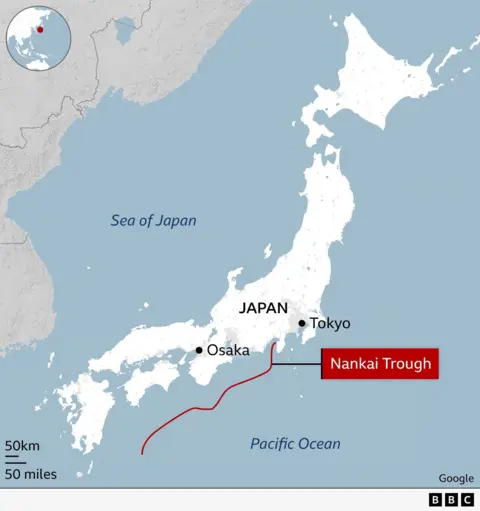Japan warns of heightened risk of megaquake
Japan has - for the first time - issued a warning about an increased risk of a "major earthquake" striking in the near future.
The advisory was issued on Thursday night local time, telling people to be alert but not to evacuate. It also stressed that the warning did not mean a large earthquake was imminent, but that the probability was higher than usual.
It came hours after a 7.1 magnitude earthquake occurred off the southern island of Kyushu, which reportedly caused no major damage.
But experts were put on heightened alert because of where the epicentre sat - at the edge of the Nankai Trough, an area of seismic activity which stretches along Japan's Pacific coast.

The plate boundary sits between Suruga Bay in central Japan, and the Hyuganada Sea in Kyushu to the south.
Previous Nankai Trough earthquakes have left thousands dead. These megaquakes have been recorded once every 90 to 200 years, with the last one occurring in 1946.
Experts say there is a 70% to 80% chance of a magnitude 8 or 9 quake striking somewhere along the trough in the next 30 years, according to the Kyodo News agency. Worst-case estimates suggest more than 200,000 people could be killed in the earthquake and potential subsequent tsunami.
However, at a press conference on Thursday, Japanese Meteorological Agency official Shinya Tsukada emphasised that while "there is a relatively higher chance of another major earthquake compared to normal times" they were not saying it would definitely happen "in a certain period of time".
This current advisory - the lower of two types of alerts at officials' disposal - will be in place for a week.
It asks residents to be on higher alert in the coming days, and for those who cannot evacuate quickly to consider doing so voluntarily, according to Japan's NHK broadcaster.
Officials have also told people be cautious but carry on with their everyday lives, while checking evacuation routes where needed and that households have enough supplies.
